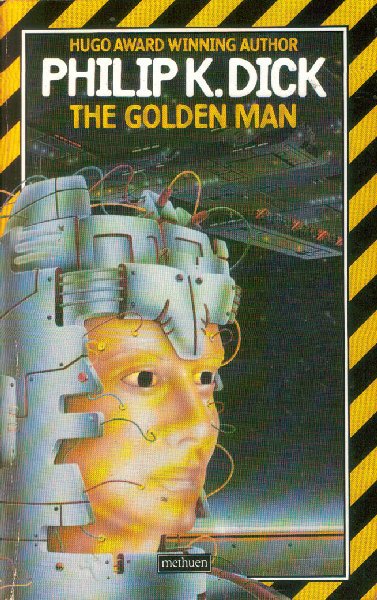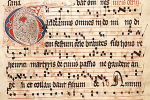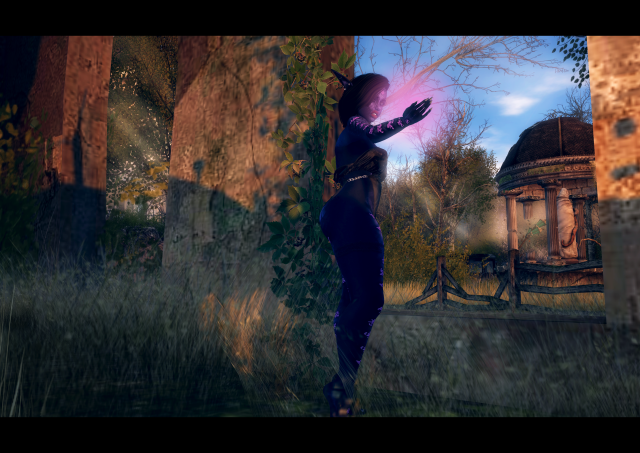The PKD series continues.
Raw Feed (1989): The Golden Man, ed. Philip K. Dick, 1980.
“Foreword”, Mark Hurst — Standard collection intro on why book was done and its history.
“Introduction” — Brief tour of the life of Philip K. Dick, a subject as fascinating as any of his novels. We hear of Dick’s anger and love of sf and his friends in it (particularly Norman Spinrad and Thomas E. Disch but also Roger Zelazny and Robert Heinlein — who loaned Dick money and who, though Dick was almost completely opposite politically to him, Dick loved. His adoration in France, his fascinating life on the streets, his many loves of women and music, is all dealt with. It reminds me how much, more than any other author, I wish I would have met Dick while he was alive.
“The Golden Man” — I’m sure too much prior knowledge of this story ruined my enjoyment of it. The story is structured to make one sympathetic towards the Golden Man (Dick comes up with an interesting assortment of mutants) and, as Dick points out in his story notes, this was the Golden Age of the sympathetic mutant in John W. Campbell’s Astounding and A. E. van Vogt’s Slan. At the end though, we are faced, like the androids in Dick’s Do Androids Dream of Electric Sheep?, with beings that seem outwardly human but are not. The pre-vision talent of the Golden Man was interesting, and Dick tried to go into some of its implications. The idea of a mutant’s sexual attractiveness was original and valid. The main strong point of the story is the turning of reader’s sympathy from the Golden Man to his hunters. Unfortunately, I spoiled my surprise.
“Return Match” — I liked this bizarre story of mechanical menace via a lethal and quite addictive machine. The idea of a self-modifying pinball machine is unique; though Dick doesn’t use the vocabulary an author would today to describe his device, it is quite modern. I liked the world being turned into a giant pinball machine for Office Tinbane, hunted by an unknown menaces. I liked pinball becoming like a war game. The story’s only flaw was a clear explanation of what Tinbane hoped to achieve by building a catapult. He doesn’t know where to aim it after all.
“The King of the Elves” — A minor story of Dick’s. It’s only real charm is the lonely protagonist finding a life of company, adventure, and usefulness with the Elves and leaving his gas station. Having his friend be king of the Trolls was a nice touch, and Dick conveys, as usual, the menace in his story well, here it is the Trolls.
“The Mold of Yancy” — I’m not familiar with the complete works of Dick’s friend Norman Spinrad nor The Space Merchants by Frederik Pohl and C. M. Kornbluth, but it seems to me this story is similar to what I’ve heard about those works. This story of manipulating the electorate via the media is a theme of Spinrad’s and realized also in The Space Merchants. I can only dimly imagine the satiric effect this story had on its publication. Now its tale of a banal, non-coercive totalitarian (Dick makes a thoughtful distinction between dictators and totalitarians) state seems original, funny, and a bit scary since it seems plausible, and, though I don’t think things were as extreme as Dick imagined, the fifties were heading that way. I loved the line “Nobody was as harmless and vapid as John Edward Yancy.” I liked a society of non-coercion where everyone willingly conforms and becomes thoughtless (but with the illusion of thought). Yancy the construct (as in the novel this story became, The Penultimate Truth) was a fascinating concept. Though Dick’s jargon of gestalt is dated (today he would couch the story in terms of digital constructs and computerese) the concept of fake images is compelling. Yancy was also convincingly vapid. Dick shows his paranoia by having Yancy a tool in a capitalist conspiracy.
“Not By Its Cover” — A fun, humorous story about an alien creature possessed of a certain type of immortality. I like the central idea of the sentient wub altering the books it binds with hilarious results (and sometimes serious ones) and the appropriate style.
“The Little Black Box” — This story of Wilbur Mercer and his religion of empathy boxes was used in Dick’s excellent Do Androids Dream of Electric Sheep? with a changed milieu. I agree with Dick that the idea is much better realized here. Mercer is an enigmatic figure and, as in the novel, we never do get a conclusive answer as to the origin of Mercerism or, if it’s a precursor to a physical alien (or, at least, political) invasion. That question and the threat of Mercerism (and all religion to the political status quo since, as Dick states in the notes, a religion is a type of political order) is much more emphasized here. Mercerism was only under attack by androids in the novel. Dick addresses the mystery as to why someone would seek pain in the course of a religious quest. Mercer offers no salvation. Dick’s characters propose guilt and a longing for mystical communion as possible answers. On two side matters, I liked Dick’s apparently original (and slightly humorous) explanation of what happens when two telepaths meet (they know the other is trying to read their mind), and I think I see a possible explanation for Dick’s many unflattering portrayals of female characters. Joan Hrashi starts out with an unflattering portrayal. She hypocritically preaches taking responsibility for ones actions but seems totally unconcerned that Ray Meritan’s wife killed herself because of Joan’s adulterous affair with him. She even keeps the suicide weapon as a morbid trophy. She also seems neurotic. Yet, in the course of the story, she is frightened, intimidated, lonely, longing, and bullied. Perhaps Dick’s female characters are not so much mean portrayals of a whole sex and indicative of Dick’s personal view (though there is ample evidence to support that stance and also that Dick had both a wary and loving view of women) as much as full portrayals of flawed humans: neurotic, partly evil, and frightened and intimidated by life.
“The Unreconstructed M” — Another story whose idea became incorporated into Dick’s The Penultimate Truth. I liked the idea, as in the novel, of faking forensic evidence. Here, as with Rick Deckard in Dick’s Do Androids Dream of Electric Sheep?, the policeman Edward Ackers is faced with the prospective of using an increasingly fallible set of criteria for determining criminal culpability. However, unlike Deckard, Ackers is too proud to admit that justice can be fooled. Here, Ackers is also fooled by agent Garth who he takes as a madman. Here, as with the Roman style demesnes in The Penultimate Truth, Dick uses (along with the idea of the death rattle) the ancient ideal of exile for criminals. The story’s only real detraction from enjoyment was the last two pages which did not really seem to serve any purpose. Having a character named David Lantano (who appears as a very long lived Indian in The Penultimate Truth) poses the puzzling question as to why Dick cannibalized his stories with so little modification. Was he just very rushed in composition?
“The War with the Fnools” — This was a fun story. The central and end joke — that aliens become more like us by picking up the vices of smoking, drinking, and sex — was not very funny. What was funny was the Fnools utter incomprehension that their two foot high size made them immediately recognizable despite the accuracy of their impersonations.
“The Last of the Masters” — One of Dick’s morally ambiguous tales whose conflict is concisely stated in the story notes — the choice between theoretically desiring anarchy and personal freedom versus the practical benefits of government. I had little sympathy for the anarchist and found a sad grandeur in the decaying robot trying to preserve the world he had known.
“Meddler” — As Dick himself admits, this is a rather simple-minded story. It’s easily guessed that the time traveler will bring back the seeds (here literally) of man’s destruction. More emphasis on the politics of the story would have been interesting. The idea of politicians checking, illegally, the outcome of their decisions is quite plausible as is a resulting coverup. Still, as Dick points out, it is his first exploration of the latent reality underneath the obvious appearance; such exploration was to become one of Dick’s primary preoccupations.
“A Game of Unchance” — A story which simultaneously had the menace, glitter, and sleaziness of the carnival coupled with a Mars that had some of the desolate, rural flavor of Ray Bradbury’s Mars. The pompous, callous UN officials were menacing in their contempt and closed-lipedness and also a bit humorous at the same time. Given the story notes, I assume the rather ambiguous ending is indicative of the colony being set up for trouble again. The story is scary because the colonists who we sympathize with are caught in a mysterious conflict they do not understand. The microbots were sufficiently menacing.
“Sales Pitch” — This is a pre-eminently fifties piece of sf: a tale of everyday life (complete with a tiring rocket commuting from the suburbs of Earth to work on Ganymede) with a satiric barb directed at that fifties’ (and current) target of advertising. Here ads react directly on the brain and drive our hero over the edge. I disagree with Dick in finding this story a real downer. True, our hero’s last moments are not spent in peaceful contemplation but in listening to the prattle of the robot; however, I found the fasrad, a robot product that sells itself and absolutely will not take no for an answer and uses coercive measures, blackly funny.
“Precious Artifact” — A story with a typically Dickian paranoid premise: that the victors in an interstellar war have taken to impersonating the defeated humans to enlist the survivors help in restoring Earth. I don’t always find Dick’s paranoid premises moving, but I did find this one creepy in its plot of a created reality masking desolation. Dick’s love of life, here, as often, symbolized by a cat, is very evident. Humanity may be dead, killed by aliens, but the human terraformers are willing to help as long as some small part of life has survived on Earth. Its presence will catalyze them into forgiveness and aid. Ironically, the life they psychically cling to and invest with their emotions is fake (like Richard Deckard’s frog at the end of Dick’s Do Androids Dream of Electric Sheep?).
“Small Town” — On its most basic level, this is one of those vengeance tales where put-upon man takes vengeance on those around him and his town (and rightly so given his adulterous wife). As Dick points out, Verne Haskel is into destruction of hated objects not their subjugation. That element and Dick’s skill makes this an entertaining if not great story. The symbol of the model train is well realized. From an historical/sociological perspective, it’s interesting to note how, in this story (and many other Dick works I’ve read that were written in the fifties) everyone has Freudian concepts and jargon on their lips. I wonder if Dick subscribed to the stated view of model trains being a symbol of power fantasies or, given Dick’s fascination for craftsmen, he just regarded them as being kind of neat (the psychologist subscribes to both views.
“The Pre-Persons“, — A very angry and vitriolic story. I’ve read about reaction to this story and Dick’s defense. I agree in principle with Dick’s attack on abortion and the slippery, purely arbitrary and legalistic definition of when life begins — and its possibly horrifying consequences of “post-partum” abortion. The arbitrary line of snuffing 12 year olds because they don’t meet the definition of human — the ability to do higher math — seems as valid as the criteria now, and Dick works out the logical implications (including killing the Greeks and stupid adults). But Dick muddles his story and, in part, dulls his satiric blade when he introduces (especially given his life and earlier writings) what I take to be personal issues and concerns into his venom. His love of life and the defenseless comes through with the quite effective partial use of children as viewpoint characters, but it also leads him to make the connection between killing defenseless animals and children, a “hatred of the helpless … of everything that grows”. That seems an invalid connection. Simple desire to destroy doesn’t seem to be as much a motive of abortion as narcissism and carelessness. Furthermore, this view of abortion’s causes links with Dick’s distrust of authority figures to make Oscar Ferris a truly detestable figure, definitely not one of Dick’s sympathetic policemen. He loves rounding kids up, regards them as obscene little creatures. But the most noticeable theme, beside the anti-abortion stance, is that of the “castrating female”. I don’t think Dick hated women. He seemed quite attracted to them but always, for whatever reason, dissatisfied with what he found as witnessed by five marriages. Ian Best does remark that in Canada women are different than remarks that only some are, that the devouring woman has existed throughout time and space. Cynthia Best is typical of Dick’s evil women (I believe, without evidence, based on his marital experience): selfishness, nagging, and concerned with social status. There is one grisly scene when Cynthia discusses having an abortion for the novelty value and trying to decide what color the preserving fluid should be. I don’t think Dick was a misogynist though. I find it ironic that Joanna Russ (according to Dick in the story notes but I believe him) wrote a very nasty letter to Dick saying she usually offered to beat people up who said the things this story did. This is the same woman who wrote the man hating “When It Changed”. I found the ending of this story rather irritating. Dick seems to have trouble ending stories; sometimes they just trail off into irrational behavior by the characters and ambiguous outcomes between good and evil. I regard Dick as very good at characterization and dialogue; yet, I find his characters puzzling, contradictory, inconsistent, and irrational at times. I suspect that’s why they seem so human since most of us have some degree of those traits.
“Afterword“, Philip K. Dick — Basic statement by Dick (and a short one) on his basic themes of fakery, reality’s nature, trust, and love.
More reviews of fantastic fiction are indexed by title and author/editor.
Advertisements Share this:




